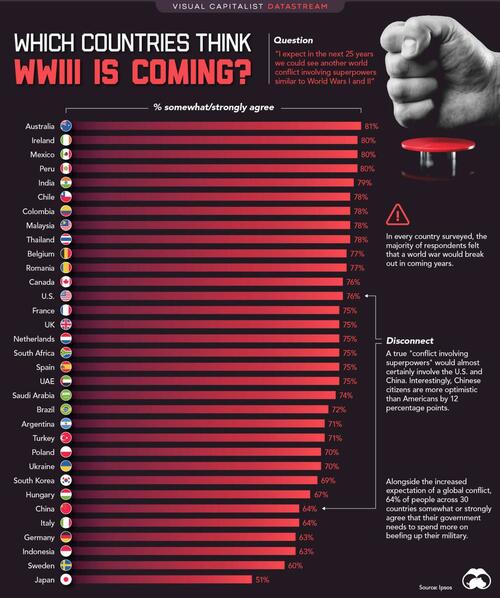
After a pandemic, rampant inflation, a faltering global economy, and geopolitical flare-ups, it’s no surprise that people have a souring outlook on the future.
Even so, the results of this recent survey by Ipsos are eyebrow raising. As Visual Capitalist's Nick Routley reports, in all 33 countries where polling took place, the majority of respondents said they believe a world war on the scale of WWI and WWII would break out between global superpowers in coming years.
Here’s a look at how various countries felt about the possibility of an impending global conflict:
Japan was the least sure of an impending global conflict - an opinion that is almost certainly shaped by the country’s historical experience in WWII.
Australia was the most certain of an impending global conflict. The country has a unique relationship with Asian and Western countries, so geopolitical tensions between superpowers may resonate more in the Land Down Under.
The Power of Fear
Given the negative slant of stories covered by mass media and the types of stories that are most widely shared on social media platforms, it’s easy to understand how people have developed such a gloomy view of the future. But “bad vibes” aside, how could this perception translate into real world action?
For one, public opinion helps shape political priorities. A narrative of impending conflict could have an impact on geopolitical policy and relationships.
Another possibility is an increase in military spending across the board. 64% of people across 30 countries somewhat or strongly agree that their home government should beef up military spending “given the dangers in the world.” Aside from Ukraine, India (84%) and Poland (81%) ranked the highest in support of increasing military spending.
One other noteworthy finding is that 85% of people in the countries surveyed believe that the world needs new international agreements and institutions to deal with the challenges faced by the world today, and that world powers are unlikely to respect agreements made through international bodies. These findings are significant since war becomes more likely as cooperation between countries breaks down.
After a pandemic, rampant inflation, a faltering global economy, and geopolitical flare-ups, it’s no surprise that people have a souring outlook on the future.
Even so, the results of this recent survey by Ipsos are eyebrow raising. As Visual Capitalist’s Nick Routley reports, in all 33 countries where polling took place, the majority of respondents said they believe a world war on the scale of WWI and WWII would break out between global superpowers in coming years.
Here’s a look at how various countries felt about the possibility of an impending global conflict:
Japan was the least sure of an impending global conflict – an opinion that is almost certainly shaped by the country’s historical experience in WWII.
Australia was the most certain of an impending global conflict. The country has a unique relationship with Asian and Western countries, so geopolitical tensions between superpowers may resonate more in the Land Down Under.
The Power of Fear
Given the negative slant of stories covered by mass media and the types of stories that are most widely shared on social media platforms, it’s easy to understand how people have developed such a gloomy view of the future. But “bad vibes” aside, how could this perception translate into real world action?
For one, public opinion helps shape political priorities. A narrative of impending conflict could have an impact on geopolitical policy and relationships.
Another possibility is an increase in military spending across the board. 64% of people across 30 countries somewhat or strongly agree that their home government should beef up military spending “given the dangers in the world.” Aside from Ukraine, India (84%) and Poland (81%) ranked the highest in support of increasing military spending.
One other noteworthy finding is that 85% of people in the countries surveyed believe that the world needs new international agreements and institutions to deal with the challenges faced by the world today, and that world powers are unlikely to respect agreements made through international bodies. These findings are significant since war becomes more likely as cooperation between countries breaks down.
Loading…







